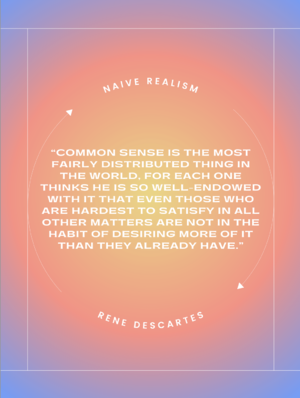The Objectivity Assumption: Difference between revisions
mNo edit summary |
mNo edit summary |
||
| Line 4: | Line 4: | ||
Our brains construct an internal representation of external events by analyzing various features. For example, colour perception is not a direct reflection of reality; colours are synthesized by our brain to differentiate light wavelengths. This means colour is an illusion, and it's impossible to ascertain that other animals perceive it as we do. | Our brains construct an internal representation of external events by analyzing various features. For example, colour perception is not a direct reflection of reality; colours are synthesized by our brain to differentiate light wavelengths. This means colour is an illusion, and it's impossible to ascertain that other animals perceive it as we do. | ||
This assumption of objectivity persists because our brain's model of the world feels real, aiding our survival. | This assumption of objectivity persists because our brain's model of the world feels real, aiding our survival. However, recognizing inherent perceptual biases in the modern world is essential. While our perceptions are subjective, this doesn’t mean all perceptions are equally valid or that objective truth doesn’t exist. It simply means we must overcome our [[cognitive dissonance]] and actively challenge our [[cognitive biases]] to approach a more accurate understanding of the world. | ||
However, recognizing | |||
Revision as of 08:32, 13 October 2024
We often assume that our perceptions are accurate and objective reflections of reality, but they are actually mental constructs shaped by our minds. Human perception is an abstraction, not a replication, of the world around us.
Our brains construct an internal representation of external events by analyzing various features. For example, colour perception is not a direct reflection of reality; colours are synthesized by our brain to differentiate light wavelengths. This means colour is an illusion, and it's impossible to ascertain that other animals perceive it as we do.
This assumption of objectivity persists because our brain's model of the world feels real, aiding our survival. However, recognizing inherent perceptual biases in the modern world is essential. While our perceptions are subjective, this doesn’t mean all perceptions are equally valid or that objective truth doesn’t exist. It simply means we must overcome our cognitive dissonance and actively challenge our cognitive biases to approach a more accurate understanding of the world.
